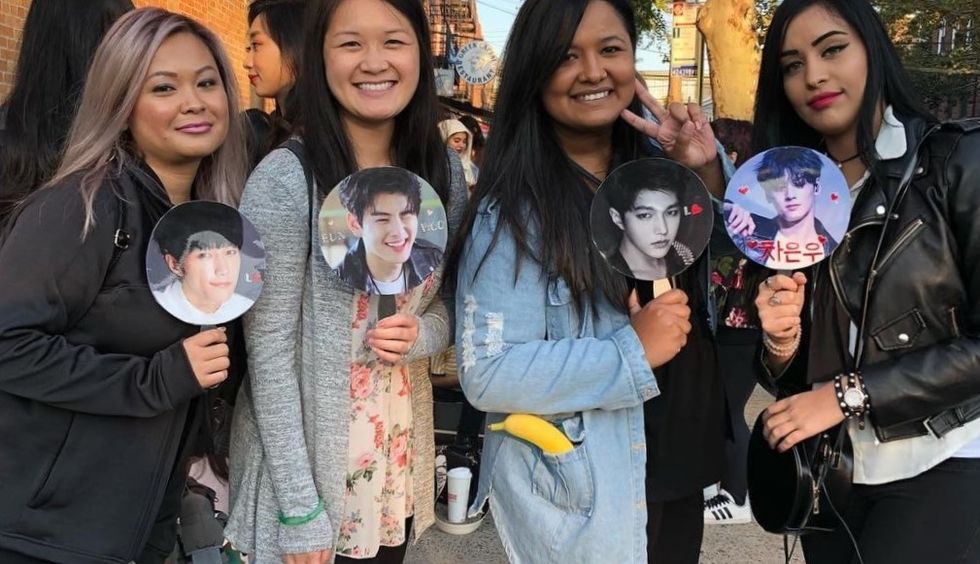Jasmine Wade struggles to get out of bed on most days, but she wasn't going to let lupus stop her from enjoying her first concert experience in New York.
Hundreds of fans queued outside of the Melrose Ballroom in Queens, New York on Sunday, Sept. 30 for K-Expo, a Korean pop culture convention featuring groups like ASTRO and The Rose. After standing in line for two hours, headaches and shortness of breath were getting the best of her. Wade couldn't wait to get into the theatre to rest her legs.
Hundreds of sweaty bodies pressed against each other in an attempt to get a glimpse of the celebrity-filled stage. Fans stuck their phones high above their heads to take photos, obstructing views of people behind them. Wade was eventually pushed to the back of the venue with nowhere to sit.
"I had to escape the chaos on the first floor," said Wade. "Once I was able to go upstairs, I got a chair and sat in the corner for the entire time Kim Myung-soo was performing."
A last-minute venue change from Pier 36 to the Melrose Ballroom may have led to the neglect of people with disabilities. But the staff and convention rules also did not help to alleviate the burdens of disabled people at this concert.
Even with an elevator at the venue, it was shut down to control the people entering the meet-and-greet. Wade had to trudge up three flights of stairs for the meeting. Wade's lupus, which comes with other ailments like fibromyalgia, osteoarthritis, and hypertension, makes it difficult to even stand or walk.
The venue change also left the convention with a smaller venue than originally advertised, confusing volunteer workers and void of food vendors. The venue announced around 12 PM that there would be no re-entry, leaving fans hungry and frustrated for hours to come.
Disabled and non-disabled people complained during the convention and after on the event's Facebook page, with many wanting refunds. Wade emailed K-Expo several times about getting a refund but no one has contacted her back yet.
Kiki Demola, another disabled attendee who had a severe ankle fracture and has trouble walking, also struggled with unhelpful staff. She said, "The security guard said, 'This is a kids' event,' when she asked why the venue didn't have handicap accessible seating."
After talking to the manager, Demola was offered a seat on the balcony with a view obstructed by lighting equipment and people pushed against each other.
When Demola had to go to her meet-and-greet, staff helped her walk up three flights of stairs. But the pain and frustration got to Demola's head and she started to cry as she walked up the stairs. She wiped away her tears before she met the Korean boyband ASTRO.
Dee Gee, who has a vision impairment, an ankle injury, and suffers from a bone condition and spinal problem felt her toes numbing while she stood in line before the concert. Her flimsy shoes and the shooting pains through her bandages made the wait unbearable. Standing on her toes without space to stretch or reposition made it worse.
With a convention lasting from 11 AM to 9 PM, Gee had to prepare herself to stand and keep herself safe from rowdy crowds. Gee said, "I was so scared of someone crashing into me, then sending me toppling or ripping my ankle open."
Gee spent most of the night with her arm bracing her lower back to protect herself from incoming elbows and camera lenses. She had to avoid slipping, tripping, or being pushed, which seems nearly impossible in a mob of screaming fans.
"For me, falling is not an issue of just getting back up," Gee said, "It could paralyze me."
She was disappointed with K-Expo's approach toward people with disabilities. Gee said, "This is a human rights issue, the way they treated us."
The American Disabilities Act prohibits discrimination against people with disabilities in areas like public and private places open to the general public. This civil rights law should make sure that people with disabilities have the same rights as non-disabled people.
But when disabled people buy expensive concert tickets to get close to the stage and then are told that accommodations can't be made for them, the enforcement of the ADA is questionable in halls like the Melrose Ballroom. Disabled people at this convention certainly did not have the same opportunities as non-disabled people.



































